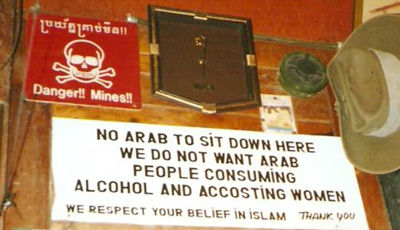
Manaugh Elementary School
[TITLE OF PROJECT]
| HOME |
| The "Us/Them" Idea |
| Exploring Orientalism in Art and Literature |
| Exploring American Indianism in Art and Literature |
| Similarities Between Tibetan and Navajo Cultures |
| Implications |
All good people agree, And all good people say, All nice people, like Us, are We And every one else is They.
Rudyard Kipling, "A Friend of the Family".
 |
Prime example of the Us, Them attitude - Jim Crow Sign
“Us and Them” is a mindset that’s fundamental to the human ego. People seem so eager to define themselves - and their teams - by whom they are not. “We are better than them over there.” “We can’t trust them.”
John Wolpert
 |
Recent example of the Us, Them attitude - Restaurant in Thailand, 2002
Which brings up the dark side: people are killed for nothing more than their membership in the "wrong" tribes. Many times in the past few years, young men who were polite and thoughtful to members of their own sort, who loved their mothers and listened to their fathers and cared for their children, set out to kill other people's mothers and fathers and children without a qualm - in New York City on September 11, 2001; in Beslan, Russia, on September 1, 2004; in Nazi-ruled Europe in the 1930s and 1940s. More examples could fill every page of this book. Throughout history, killers have worked with zeal because they believed their victims were not of the same kind as the people they cared about, the people who mattered. No wonder people both cherish and fear the power of tribal thinking. No wonder they want to understand it.
David Berreby
Frightening, eh? These are just a few of the numerous quotes that deal with the "Us vs. Them" attitude. That's why it is so important for teachers, parents, and anyone who works with children to be aware of how we view others and how we express these views to children. Separating ourselves by labeling and sterotyping groups of people is a path that leads to divisiveness in families, communities, societies, and our world. Examining stereotypes is vital to living in a global community and essential for creating peace.
 |
And Consider:
When we exoticize people it's a tool of dehumanization and it creates a distance between what we consider our homegroup and a group we consider to be different.
Jesse Benjamin
Indeed, the world over the last four hundred years has been dominated by an asymmetry of power relaitions between West and non-West. Only recently have those other peoples and cultures begun to make their voices heard. Following the postmodern dissolution of the West, postcolonial narratives or counternarratives have emerged in large numbers, interrogating and investigating the history of encounters between metropolis and periphery, colonizer and colonized, and dismantling imperial structures of knowledge and feeling in the realm of culture.
Shaobo Xie
Isn't it time to dismantle Imperialism for good?
 |